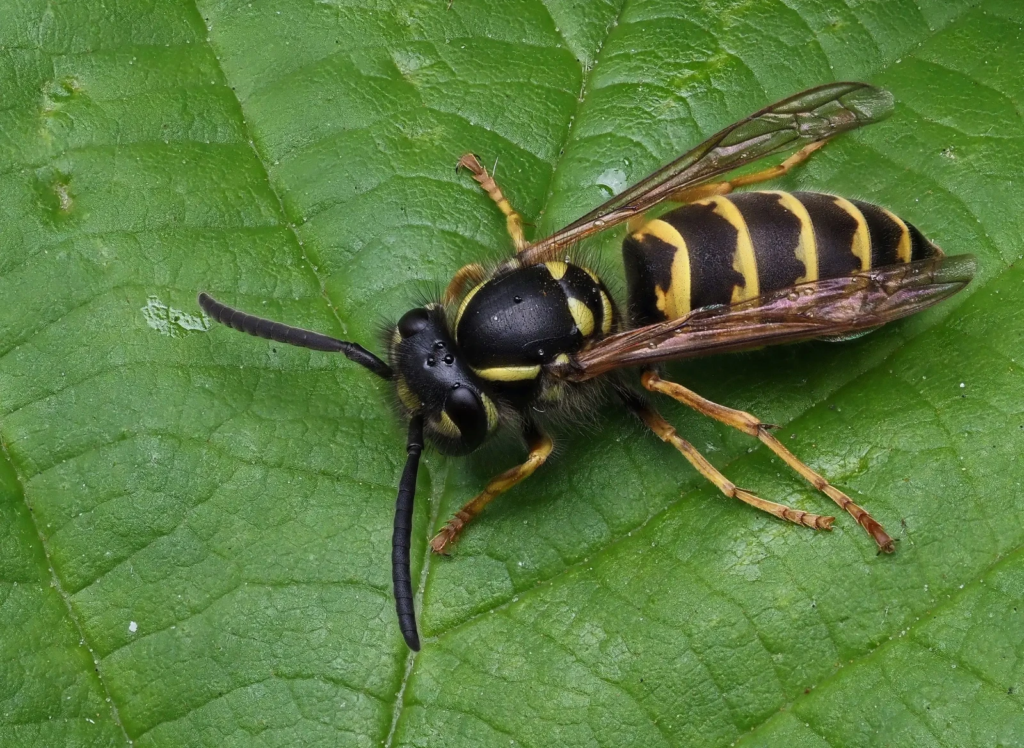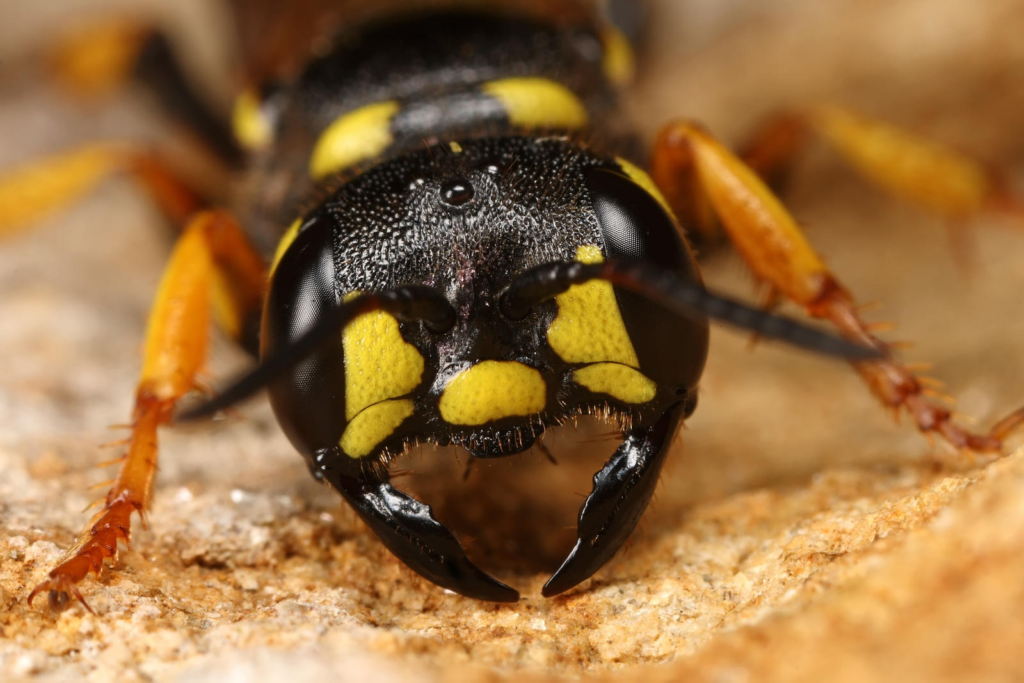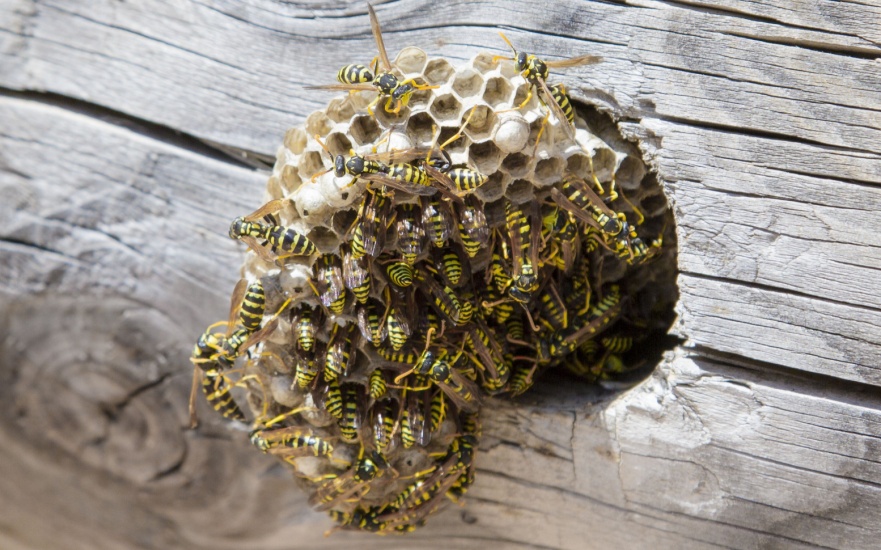Summer is here, and Charleston, SC folks are spending more time outside. This means they’re more likely to meet summer pests like wasps. A wasp problem can be serious, risking health and causing trouble. At Vinx Pest Control, we know how important it is to keep your home and family safe from these pests.
Keeping your home pest-free is key. Our team is ready to help with any pest issues. This way, you can enjoy the summer without pests bothering you.
Key Takeaways
- Summer weather increases exposure to wasps and other pests.
- A wasp infestation poses health risks and causes discomfort.
- Vinx Pest Control offers effective pest control solutions.
- Protecting your home from wasp infestations is important.
- Our team is ready to handle your pest control needs.
Understanding the Wasp Threat in Charleston
Charleston’s climate is perfect for wasps. The city’s subtropical weather and location attract many wasp species. This makes it a great place for them to live.
Common Wasp Species in South Carolina
In South Carolina, you’ll find many wasps. The Yellow Jacket, Mud Dauber, and European Hornet are the most common. Yellow Jackets are very aggressive when their nest is threatened.
Mud Daubers are less aggressive. They build their nests out of mud. European Hornets are big and can be very aggressive when defending their nests.
- Yellow Jacket: Known for their bright yellow and black coloring and aggressive behavior.
- Mud Dauber: Recognizable by their long, slender bodies and mud nests.
- European Hornet: Larger than other wasps, with a more painful sting.

Why Charleston’s Climate Attracts Wasps
Charleston’s climate is warm and humid. This makes it perfect for wasps. The city’s water and green plants offer food and shelter for them.
Wasps are drawn to Charleston for several reasons:
- Warm temperatures that allow wasps to be active year-round.
- Abundant food sources, including sweet drinks and proteins.
- Moist environments that facilitate nest building.
Identifying Different Types of Wasps in the Lowcountry
Charleston’s climate draws many wasp species. Knowing them is important. The Lowcountry has many wasps, each with its own look and ways.
Yellow Jackets: The Aggressive Defenders
Yellow jackets are very aggressive, mainly when their homes are in danger. They stand out with their bright yellow and black colors. These wasps live in big groups, which worries homeowners a lot.
Paper Wasps: The Nest Builders
Paper wasps are famous for making complex nests from paper-like stuff. They are not as mean as yellow jackets but will fight back if needed. You can find them near your home’s edges, attics, and other safe spots.
Hornets: The Larger Threat
Hornets are bigger and can hurt more with their sting. They make huge nests in trees or on buildings. Though not as aggressive as yellow jackets, hornets will fiercely protect their homes if they feel threatened.
Knowing the different wasps is key to managing them well. By figuring out which wasp you have, you can take better steps to keep your home safe.

Signs of a Wasp Infestation on Your Charleston Property
Spotting signs of a wasp infestation is the first step to protect your Charleston home. Catching it early stops a small issue from growing big. We must know the signs wasps are around and act fast.
Visible Nests and Their Locations
Seeing nests is a clear sign of wasps. They build nests in safe spots like eaves, attics, and under porches. Look for nests in these places:
- Under roof eaves
- In attics or garages
- Inside wall voids
- Under porch ceilings
Increased Wasp Activity Around Your Home
More wasps around your home is another sign. If lots of wasps are near food or nesting spots, you might have an infestation. Watch for:
- Wasps flying around food and drinks outdoors
- Wasps entering or exiting a specific area of your home
- An increase in wasp stings or aggressive behavior
The Dangers of Wasp Stings and Health Risks
Wasp stings can cause different reactions. Some people feel a little pain, while others face serious health issues. Knowing these risks helps keep you and your home safe.
Allergic Reactions and When to Worry
Allergic reactions to wasp stings can be mild or very serious. Some people might just itch a bit, while others need help right away.
Common Symptoms of Wasp Stings
- Redness and swelling at the sting site
- Itching or hives
- Pain or a burning sensation
Signs of Severe Allergic Reactions
Severe allergic reactions are very dangerous. Look out for trouble breathing, a fast heartbeat, or low blood pressure. If you see these signs, get help fast.
Multiple Stings and Their Consequences
Getting stung many times can be very bad. It can cause more pain, swelling, and even anaphylaxis. Anaphylaxis is a serious allergic reaction that needs quick medical help.
If you get stung a lot, watch your body closely. If you see signs of a bad reaction, get medical help right away.
Effective Wasp Prevention Strategies for Coastal Homes
To keep your Charleston home wasp-free, you need to take action. Learn about wasp habits and act early. This way, you can protect your home from these pests.
Sealing Entry Points Around Your Home
Wasps can sneak into your home through small openings. So, it’s important to seal all cracks and crevices. Look for gaps around windows, doors, vents, and chimneys. Use caulk or weatherstripping to block these openings and make sure your foundation is strong.
- Check your home’s exterior often for damage or wear.
- Seal any gaps or cracks with caulk or weatherstripping.
- Install door sweeps or thresholds to keep wasps out under your doors.
Managing Food Sources and Trash
Wasps love food and sweet things. So, it’s key to manage your trash and food well. Keep trash cans sealed and store them away from your home. Clean up spills and avoid leaving food or drinks outside.
- Use trash cans with tight-fitting lids to keep wasps out.
- Store pet food and bird seed in sealed containers.
- Clean up any food or drink spills right away.
For more tips on managing wasp infestations, check out our page on seven easy and effective wasp control.

Landscaping Tips to Deter Wasps
Your landscaping can either attract or keep wasps away. Avoid planting flowers or shrubs with lots of nectar. Keep your yard clean and trim trees or shrubs often to stop wasps from nesting.
- Choose plants that wasps don’t like, like those with little nectar.
- Keep your yard clean and free of debris.
- Trim trees and shrubs regularly to prevent wasp nesting.
Natural Wasp Repellents and Deterrents
We can keep wasps away from our homes naturally. This method avoids harsh chemicals. It also makes our homes wasp-free in a green way.
Essential Oils That Repel Wasps
Some essential oils keep wasps away. Peppermint, lemongrass, and clove oils work well. We can use them in diffusers or mix with water for spraying.
Plants That Naturally Deter Wasps
Some plants keep wasps away. Mint, basil, and chamomile are good examples. They are pretty and keep wasps out.
DIY Wasp Traps and Baits
DIY wasp traps are a smart way to manage wasps. You can make one with a jar, sweet liquid bait, and paper. This traps wasps inside.
DIY Wasp Nest Removal: Dos and Don’ts
Removing a wasp nest safely is very important. Wasps can get angry and sting hard. This can hurt your health a lot. Before you try to remove a nest, know the risks and be careful.
Safety Precautions Before Attempting Removal
To stay safe while removing a wasp nest, follow these steps:
- Wear protective clothes like a beekeeping suit, gloves, and a veil.
- Do it at night when wasps are less mean.
- Use dust or foam insecticide to avoid upsetting wasps.
- Plan a way to get out quickly before you start.
Learn more about wasps being a threat at our page on 3 reasons why wasps are bad.
Effective Removal Techniques
After you’re safe, you can remove the nest. Here’s how:
- Use dust insecticide made for wasps.
- Spray it right into the nest until it’s full.
- Wait 24 hours before checking if wasps are back.
- If wasps are there again, do it twice or call a pro.
When DIY Methods Are Not Recommended
DIY can work, but not always. You might need a pro for:
- Nests in places you can’t reach, like high up or inside walls.
- Big nests with lots of wasps.
- If someone in your family is allergic to wasp stings.
In these cases, it’s better to call a pest control service. They can do it safely and right.
Professional Wasp Control Services in Charleston
Hiring pros for wasp control is often the best choice. Dealing with wasps can be scary. They can sting and it’s hard to get rid of their nests.
Benefits of Hiring Experts for Wasp Removal
Experts offer many benefits for wasp removal:
- Safety: They have the right tools and gear to safely handle wasp nests.
- Effectiveness: They make sure all wasps are gone, so they don’t come back.
- Efficiency: They find and treat wasp nests fast, saving you time.
Choosing professional wasp control services in Charleston means peace of mind. You know your wasp problem is in good hands.
What to Expect During Professional Treatment
Knowing what happens during wasp control helps you prepare.
Initial Inspection and Assessment
The first step is a detailed check of your property. They find out how bad the wasp problem is and where the nests are. This helps them plan the best treatment.
Treatment Methods and Follow-up
Experts use different methods for each wasp problem. They also come back to check if all wasps are gone. They teach you how to keep wasps away in the future.
Wasp Sting Treatment and First Aid
If you’ve been stung by a wasp, it’s important to know how to treat it. Wasp stings can hurt, swell, and cause serious allergic reactions. Knowing how to react can help keep you safe and comfortable.
Immediate Steps After Being Stung
Act fast after a wasp sting to lessen the venom’s effects. Here’s what to do:
- Remove the stinger by scraping it off with your fingernail or a credit card. Don’t pinch or squeeze it, as this can release more venom.
- Wash the area with soap and water to prevent infection.
- Use a cold compress or ice pack to reduce swelling and ease pain.
- Elevate the affected area above your heart to lessen swelling.
- Take an antihistamine or use a topical cream to ease itching and redness.
When to Seek Medical Attention
While most wasp stings can be treated at home, some need medical help. You should get help if you have:
- Difficulty breathing or swallowing
- Rapid heartbeat or palpitations
- Dizziness or fainting
- Swelling of the face, lips, tongue, or throat
- Abdominal cramps, nausea, or vomiting
For more info on wasp sting dangers, visit our page on whether wasps are dangerous. If you’re experiencing any of these symptoms, get medical help right away.
Why Vinx Pest Control is Your Best Choice for Wasp Removal in Charleston
Vinx Pest Control is the top pick for wasp removal in Charleston. Our team works hard to keep your place safe from wasps.
Our Specialized Wasp Control Methods
We use special wasp control methods for Charleston homes and businesses. Our methods include:
- Thorough inspections to find wasp nests and activity
- Custom treatment plans to get rid of wasps
- Safe and quick removal to cause less trouble
Our Commitment to Safety and Effectiveness
Safety is key when dealing with wasps. We use the latest methods and tools for safe wasp removal. Our promise includes:
- Choosing eco-friendly products when we can
- Teaching you how to stay safe after treatment
- Checking back to make sure wasps are gone for good
Choosing Vinx Pest Control means you’re in good hands. Our team is skilled, professional, and ready to make your space wasp-free.

Conclusion: Enjoy a Wasp-Free Home in Charleston
Homeowners in Charleston can keep their homes safe from wasps. They can seal entry points and manage food sources. Using natural repellents also helps.
At Vinx Pest Control, we know how important a safe home is. Our wasp control methods keep your home safe all year. With proactive steps and professional help, you can enjoy Charleston without wasps.
Keeping your home wasp-free in Charleston is possible. With the right knowledge and help, you can have peace of mind. Take control of your home’s pest management today.
FAQ
Q: What are the most common types of wasps found in Charleston, SC?
A: In Charleston, SC, you’ll often see yellow jackets, paper wasps, and hornets. Knowing the difference is key to managing them well.
Q: How can I identify a wasp infestation on my property?
A: Look for nests, more wasps around your home, and wasps in odd places. Catching it early helps a lot.
Q: What are the dangers of wasp stings, and when should I seek medical attention?
A: Stings can cause allergies and serious health issues with too many. If you have trouble breathing or feel dizzy, get help right away.
Q: How can I prevent wasp infestations on my Charleston property?
A: Seal your home, manage food and trash, and use landscaping to keep wasps away. Natural repellents work well too.
Q: Can I remove a wasp nest myself, or should I hire a professional?
A: DIY removal is okay for small nests. But for big ones or hard spots, get a pro for safe removal.
Q: What are the benefits of hiring a professional wasp control service?
A: Pros like Vinx Pest Control use special methods and care about safety. They’ll check your place, find the wasps, and treat them right.
Q: How can I treat a wasp sting, and what are the immediate steps I should take?
A: Clean the sting with soap and water, use a cold pack, and take meds if needed. Severe symptoms mean you need a doctor.
Q: Why should I choose Vinx Pest Control for wasp removal in Charleston?
A: Vinx Pest Control is all about safe and effective wasp control. Our experts will make your home wasp-free.
Q: What are some natural wasp repellents and deterrents I can use?
A: Try peppermint and lemongrass oils, mint and basil plants, and DIY traps. They’re good with other prevention steps.
Q: How can I prevent wasps from nesting in my yard?
A: Keep your yard clean, don’t leave food outside, and trim trees and shrubs. This makes your yard less appealing to wasps.



